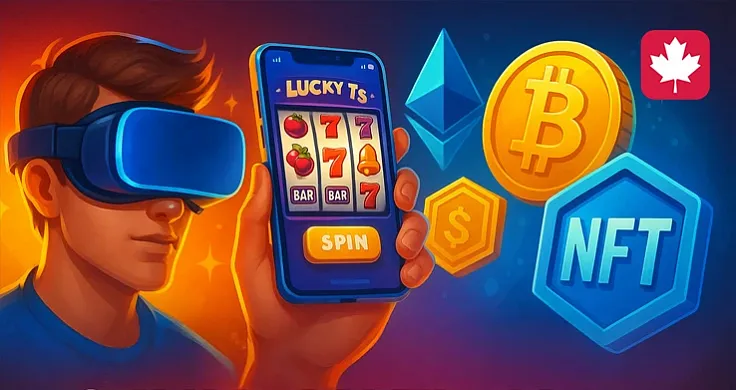
From Breakthroughs to Failures: What Really Changed iGaming
Online gambling, despite its digital nature, is one of the most cautious and inertial areas. Players do not like changes, and operators are in no hurry to implement new solutions so as not to lose a loyal audience.
We have collected 14 key technological solutions that have left their mark on the history of iGaming. Which of them became the standard, and which remained in the basement "expensive and meaningless"?
Technologies that have turned the industry upside down
The mobile revolution: play wherever we want
The development of mobile communications and the growing popularity of smartphones have completely changed the way content is consumed on the Internet — and gambling is no exception. According to the latest data from Similarweb, by 2025, about 68% of all Internet traffic comes from mobile devices. This means that most players launch casinos, slots, and bets directly from their phones.
Historically, it all started in 2007 with the first iPhone, and then with Android devices. Already in 2009, the FanDuel bookmaker launched the first mobile version of the site, and in 2010, three major players at once — FanDuel, William Hill, and Betfair — introduced the first mobile betting applications. The problem was that all these solutions worked on HTML4 — an outdated standard that did not allow us to make convenient and beautiful interfaces.
HTML5 Breakthrough: Games Become Smooth and Responsive
The situation changed radically in 2014, when the HTML5 standard was established on the market. It allowed developers to create interfaces that work equally well on any device – PCs, tablets, and smartphones.
Providers began to actively redesign slot interfaces for touch control, enlarge elements, add swipes, and simple navigation. As a result, gambling has become truly "mobile": you can play in line, on a walk, or lying on the couch. This also changed the behavior of the players themselves: the game became more spontaneous and frequent.
Cryptocurrency: fast anonymous payments without intermediaries
In 2009, bitcoin appeared, and this gave gambling a new option: to conduct transactions without banks, quickly and almost without commission. Cryptocurrencies have become a godsend for offshore operators, where traditional payments are often blocked.
Today, crypto transactions are available on almost all sites where it does not contradict the license. According to SoftSwiss, in 2023, more than 27% of all bets on the platform were made in cryptocurrencies. Moreover, the number of such transactions increased by 50% compared to 2022.
Gamification: When Excitement Is Not Just a Bet
Gamification is not about the game itself, but about everything that surrounds it. Loyalty programs with levels, leveling, chests, and loot boxes. Online tournaments and leaderboards. Daily quests and activity rewards.
The mechanic originated back in the 80s, when Richard Bartle described the behavior of players in multiplayer games. In gambling, it has received a second life: gamification allows you to increase engagement, retain players, and make the platform more "adventurous". This turns the casino not into a place where you just bet money, but into a full-fledged entertainment hub.
Streaming and live casino: from Twitch to a real dealer
Live streaming became mainstream after the launch of Twitch in 2011. In iGaming, technology was used in two directions at once:
- Streamers and ambassadors. Popular streamers like Papic or Evelone began to receive gifts from casinos — cars, trips, money. All this is for the sake of live advertising.
- Livecasino. The technology allows you to broadcast a game with a live dealer in real time: roulette, poker, blackjack, as well as show games like Crazy Time or Monopoly Live. The atmosphere of a real casino is without the need to leave your home.
Streaming has built trust, made games more "alive" and gave a new emotion — a sense of presence.
Technologies that have taken their niche
Blockchain Casinos: Openness, but Without Mass
The first decentralized casinos like SatoshiDice and Primedice were in operation back in 2013. Players made bets directly from crypto wallets, and all transactions were recorded on the blockchain. The idea is excellent: absolute transparency, no registration, complete anonymity.
But such casinos have remained niche. The reasons are the lack of fiat payments, inconvenience and technical entry threshold. Players still prefer the usual platforms with cards, Google Pay and Apple Pay.
NFT: A Hype That Went Through
In 2021, the entire Internet was talking about NFTs. Some gambling companies managed to make good money: Rollbit sold 7000 NFT cards for $1000 in one hour. Now this wave has subsided.
Some providers like Truelab continue to use NFTs as part of Web3 platforms, creating collectible tokens based on their own games. But mass adoption, as with skins in CS2 or cards in FIFA, never happened.
Artificial intelligence: the potential is enormous, but still in the shadows
AI is still more of a backend technology. Companies use neural networks in:
- hiring staff;
- generating advertising creatives;
- user support;
- bid and data management.
Now it is more of a tool for business optimization. But by 2030, explosive growth is predicted — from AI dealers to automated platforms with full personalization.
Multiplayer in Gambling
Slots are single-player in nature. But new formats like Aviator have added a multiplayer feel. Chats, paylines, leaderboards, and real-time events create a "social" gambling experience.
Microbetting: betting on everything
Do you want to bet on whether the next corner will be in the 15th minute? This is microfetting – betting on the smallest episodes. In the United States, this already brings billions of dollars a year. But so far, the technology is expensive and difficult to implement. In the CIS, it is almost not represented, except for rare cases - like Liga Stavok.
Technologies that did not take off
Biometric verification
The idea is simple: confirm your identity by face or fingerprint and play. Regulators want to implement this to combat gambling addiction and protect minors.
Operators are in a panic. Anonymity is one of the key values for many players. So far, no country has made biometrics mandatory for online casinos. And it is unlikely to do so in the coming years.
Telegram Casinos: Rise and Fall
With the launch of mini apps in 2023, Telegram has become a gambling paradise. Slots, clickers, fast platforms have appeared. But in 2024, clean-ups began: Telegram is fighting illegal casino content in preparation for the IPO.
More than a million channels have been removed, including the biggest brands. Only "gift" mechanics and NFT roulettes remain, which are disguised as gaming applications.
VR in Casinos: A Good Idea, but Not Now
There have been attempts to launch VR gambling: Microgaming, NetEnt, even Gonzo's Quest in VR. But everything rested on the high cost, weak graphics and lack of mass devices. Players are not ready to buy a helmet for $500 for the sake of slots.
Smart devices: refrigerator as a casino? For real?
The story of American bloggers who played online slots through the panel of a smart refrigerator is more of an anecdote than an industrial case. The controls are awkward, the animations are slow, and the Wi-Fi is unstable. A smartphone is more convenient in everything.
Inference
Technologies in gambling work when they solve real problems:
- Mobile devices gave convenience.
- Crypto — anonymity and security.
- LiveCasino is an atmosphere.
But attempts to introduce something for the sake of hype fail. The essence of innovation remains the same: not just "something new", but a solution to a specific user pain. As long as the industry remembers this, it will develop.




celese Haha, classic! First they screwed over the players, then the license turned out to be fake, and now they’re trying to undo everything. A total circus. Yeah, everything will just get bought. They’ll pay whoever they need in Curaçao and get a new license. Money rules everything, especially in this industry.



Mangarin4ik The section about how casinos fire VPNs is a gun. I've never thought about WebRTC and the time zone. Author, thank you, you may have just saved my next deposit.





































NFTs in Casinos? Well... Too complicated, incomprehensible and no longer fashionable.
Micro betting is a thrill, but it doesn't work well anywhere in our country. I want to bet on every corner, not just on the total.
As a result, in the red more than with a regular rate
Mobile versions are top! I don't remember the last time I played with a PC.
If VR was really available, I would be stuck in the casino with glasses 24/7. But so far, alas, it is expensive and useless.